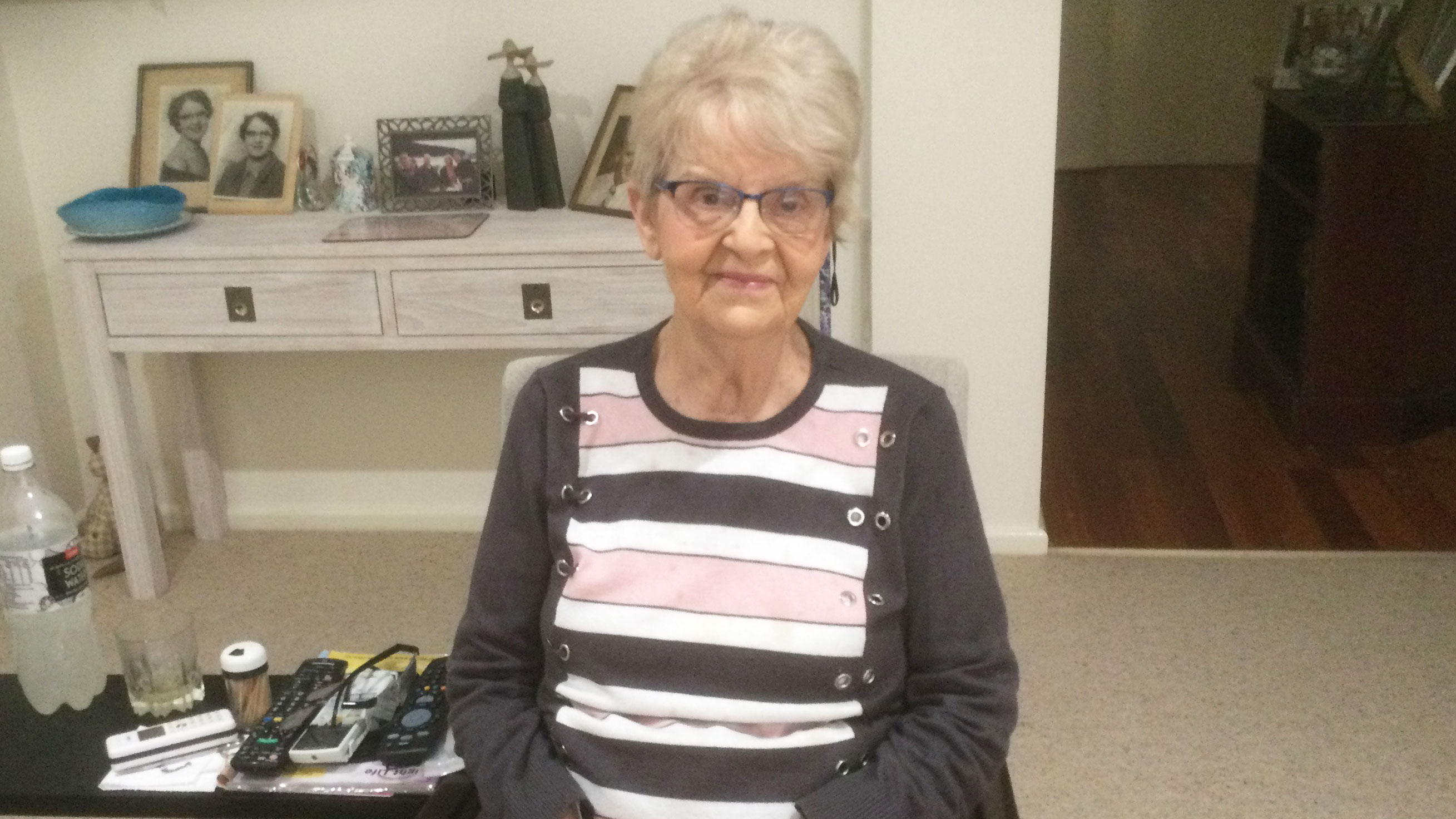An elderly Sydney woman says she feels "violated" after a fraudster stole $23,500 from her by tricking her daughter in an impersonation scam.
Maureen Deans, 86, was left with just $200 in her St George Bank pensioner account after the scammer struck last month.
"How could they be so cruel? I'm horrified that people would do this sort of thing," Maureen said.
"I was left with no money to pay my bills."
READ MORE: Phone call reveals clever tactics used by 'Westpac' scammer

The nightmare began for Deans and her daughter Joanne on July 29.
On that day, Joanne got a text message from Medicare saying she had been in close contact with someone who had COVID-19.
It asked her to click on a link to order a coronavirus test kit.
Services Australia has issued warnings about similar scam SMS messages, but at the time Joanne was not aware of them.
"Someone at my work had just tested positive to the coronavirus. I could just kick myself now, but that's the reason I clicked on the link," she said.
Do you have a story? Contact reporter Emily McPherson at empcherson@nine.com.au.
Joanne was asked to enter her credit card details and a home address for delivery of the test kit.
Realising soon after that it was likely a scam, Joanne said she went into her local St George branch and reported the incident, expressing her concern that her credit card details may have been compromised.
READ MORE: Husband left Melissa Caddick note and gift after raid

Then, less than a week later on August 3, Joanne got a call on her mobile phone from a man named "Simon" who said he was from St George's fraud prevention team.
The man informed Joanne her account had been hacked and said her mother's account, for which she is a signatory, was now compromised.
"He said that he had been authorised by St George Bank to move mum's money over to a brand new account, with a new BSB and account number," Joanne said.
Joanne said she was sceptical of the man, but he appeared to be very professional and eventually convinced her he was legitimate.
"I said, 'Why can't we just go into the bank tomorrow and sort it out there' and he said, 'No, the money will be gone by then,'" she recalled.
"He gave me a reference number and he was very convincing.
"He knew exactly how much money mum had in her pensioner account down to the last cent."
Joanne said the scammer's call appeared on her phone as coming from "St George equipment".
"I asked him about that and he said that's just the number that comes through," she said.

Once he had gained her trust, the man asked Joanne to log on to her internet banking, to which her mother's pensioner account was also connected.
He gave her the BSB and account number of her mother's "new account" and asked her to transfer the money over three transactions - $4500, $9500 and $9500.
Joanne said after she transferred the money and had been on the phone an hour with the scammer, her mother - who was with her at the time - grew suspicious about how long the process was taking.
"My mum rang my brother who is a lawyer and he said, 'No, no, no it's a scam, get off the phone.'
"But the damage had been done, the money had already been transferred."
Joanne said she was devastated to have been tricked by the scammer.
"It's absolutely awful. It's a lot of money and it's my fault, I should have hung up," she said.
Maureen, who lives in an aged care home and receives the pension, said she had to accept help from her son to pay her bills.
"Fortunately, my son came to my aid and put money in my account, but I have never been in that situation before - I feel violated," she said.
"It took me ages to save up that money and we were going on a cruise next year, which we've had to cancel.
"There's a quite a few things we've had to cancel because of this."
Maureen said she believed St George Bank should be protecting its elderly customers better.
"I'm furious with St George Bank for allowing three large transactions like that to go through within the same hour," she said.
"Why didn't the bells and whistles ring? Why didn't they ring me and verify?
"This is a pensioner account. Apart from a couple of cruises I paid for, which involved a few thousand dollars, my transactions have never been more than $500 or so.
"Yet they allowed these three large amounts to be transferred."
A spokesperson for St George Bank said they could not comment on individual customer matters for privacy reasons.
"St.George invests heavily in scam prevention and has robust processes in place to alert and protect customers. We work hard to recover money for customers where possible," the spokesperson said in a statement.
"When funds are unable to be retrieved, reimbursement is considered on a case-by-case basis with a range of factors taken into account."
The bank said it had been experiencing a recent spike in impersonation scams where scammers pose as a known business to trick people into sending them money.
"Customers should be wary of any unexpected calls, SMS or emails claiming to be from their bank or other reputable organisation, and always stop to consider what you're being asked to do.
"If in doubt, hang up and call back on a publicly listed number to confirm if the call was genuine."
ACCC calls on banks to act
Australians lost a record $2 billion to fraudsters last year amid a sustained increase in scams.
Despite the varied ways victims are being targeted, most payments to scammers still take place via traditional bank transfer, the Australian Competition and Consumer Commission (ACCC) says.
ACCC said in its July scam report Australian banks were in a unique position to help shut down scams.
The consumer watchdog has called on banks to adopt similar methods to those already in place in the UK, where banks match an account number to the name of the intended recipient.
Scammer red flags:
-
Unsolicited contact: They unexpectedly call, SMS or email you claiming to be from a reputable business
-
They know personal information: They have often already fraudulently obtained personal details like your name, ending digits on your credit card or approximate location, which makes them appear legitimate
-
They want you to action something: They will often instruct you to complete an action while on the phone to them – like updating your banking details, increasing your daily payment limit, downloading an app or sending money to a "new" account
-
They use spoofing software: They may use software to send you a fake SMS that appears to be from the business they say they're calling you from while on the phone with you to convince you the call is genuine.
(Source: Westpac Group)
Source: https://ift.tt/FS7qth0
Comments
Post a Comment